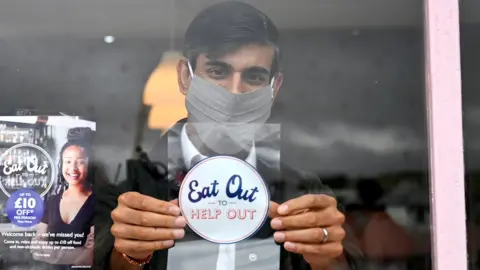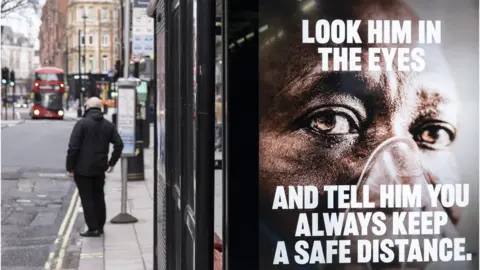Experts had too much power over Covid lockdowns, says Rishi Sunak
 Reuters
ReutersRishi Sunak has said the government gave too much power to scientists during Covid lockdowns - and was not honest about the potential downsides.
The Tory leadership contender and former chancellor told the Spectator ministers were banned from talking about the "trade-offs" involved.
He also said it was "wrong to scare people" with posters showing Covid patients on ventilators.
Former No 10 aide Dominic Cummings said he was talking "dangerous rubbish".
Mr Cummings, a key Downing Street adviser during the first part of the pandemic, said the interview "reads like a man whose epicly bad campaign has melted his brain and he's about to quit politics".
Scientists who advised the government during the pandemic have also hit back at Mr Sunak's comments, stressing that ministers were always responsible for decisions made.
Mr Sunak attempted to laugh off Mr Cummings's jibe in an interview on BBC Radio 4's The World at One, insisting he was not about to leave politics and there was still "everything to play for" in the Tory leadership race.
His Tory leadership rival Liz Truss, the favourite to become the next PM on 6 September according to polls of party members, said the government had gone "too far" with lockdowns, "particularly on keeping schools closed".
Pressed on whether she had voiced this criticism at the time, she said she had not sat on the government's key Covid committee in her role as foreign secretary, but she had been on of the "key voices in favour of opening up" within the cabinet.
 Getty Images
Getty ImagesAs chancellor from February 2020 to July 2022, Mr Sunak established furlough and the Eat Out to Help Out scheme, and has previously questioned the extent of the restrictions imposed to curb the virus.
In his Spectator interview, he said the negative impacts of lockdowns on society were "never part" of internal discussions, adding meetings were "literally me around that table, just fighting".
Ministers were also told not to discuss the potential downsides in interviews, he added.
"The script was not to ever acknowledge them. The script was: 'Oh there's no trade-off, because doing this for our health is good for the economy.'"
He insisted he had made an "emotional" plea to keep schools open, but was met with "a big silence" from his colleagues.
Asked if more frank discussions would have enabled Britain to avoid lockdowns, he said: "I don't know, but it could have been shorter. Different. Quicker."
Mr Sunak also said ministers were not given enough information to scrutinise analysis produced by official scientific advisers on the Scientific Advisory Group for Emergencies (SAGE), and internal opposition to certain measures from advisers was not reflected in official minutes of meetings.
"This is the problem," he was quoted as saying, "if you empower all these independent people, you're screwed".

A bit late in the day?

This isn't the first time Rishi Sunak has expressed concerns about his own government's handling of the pandemic.
Early in the leadership campaign, he said he flew back from California when the Omicron variant was spreading rapidly in order to stop a Covid lockdown.
But in his Spectator interview, he goes further in denouncing the whole approach of the government he served in - what he calls "the fear narrative".
And the implication is that it was he and not his Tory leadership rival who was asking the difficult questions about the scientific advice.
Of course, Liz Truss at the time did not have a domestic portfolio and would not have attended many of the Covid meetings that were held between full cabinet gatherings.
Mr Sunak's team insist this was not a planned intervention in the leadership contest - it was simply that the Spectator wanted to ask about lockdown.
The point he was making was not an attempt to rake over the past, they say.
Instead, it was to emphasise he would do things differently in government - with more accountability and with ministers being given the information they need.
It is likely, though, that the concerns he expressed in his interview - about school closures, an NHS backlog and the economic impact of the pandemic - will be shared by a significant segment of the Conservative membership.
But with just 10 days to go, it may be rather late in the day for him to open a new front in the leadership battle.

Prof Graham Medley, who chaired a SAGE sub-committee during the pandemic, said its meetings were "about the science, not the policy options," and the minutes reflected "scientific consensus at the time".
"If one member of cabinet thinks that scientific advice was too 'empowered' then it is a criticism of their colleagues rather than the scientists," he added.
Prof Ian Boyd, another member of SAGE in the pandemic, said scientific advisers "did not make decisions," and gave advice "based on the information available at the time".
He said its members were "acutely aware of the trade-offs" for different measures, and these were included in the advice "to the extent that it was possible with the information available at the time".
Downing Street said education and the economy had been "central to the difficult decisions made on Covid restrictions," alongside public health.
A Whitehall source has told the BBC Mr Sunak's Treasury had "consistently opposed other measures to deal with Covid".
"They sought to cut testing at the earliest opportunity, opposed the purchase of antivirals and at the outset weren't behind the vaccine plan," the source added.
